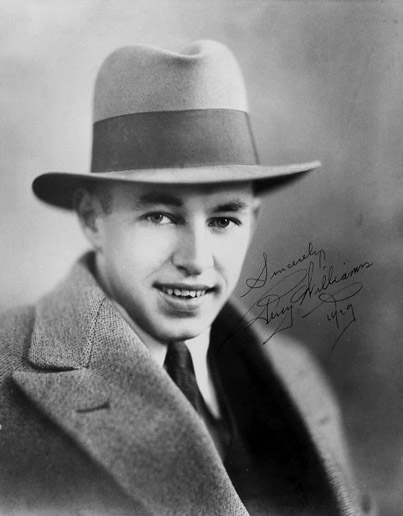Hall of Famer
Percy Williams
Inducted in 1955
Member Details
Career Highlights
Amsterdam Olympic Games - Gold medal, 100m and 200m
Named Canada's Top Track and Field Athlete of the half-century
Named an Officer of the Order of Canada

Story
In 1950, when a Canadian Press poll was held to determine Canada's greatest athletes of the half-century, voters were also asked to recall the most dramatic event in Canadian sport for this same time period. The choice was obvious: Percy Williams' thrilling double victory in the 100m and 200m races at the 1928 Olympics. Though slight, sickly, and spindly as a teenager, Williams was a bullet on his Vancouver high school track. In 1926, his incredible speed caught the attention of coach Bob Granger, who immediately took him under his wing and began to prepare the young athlete for the great races of which he knew him to be capable. By 1927, Williams had beaten some of the finest sprinters on the west coast and broken his province's records in the 100yd. and 220yd. dashes. At the British Columbia Olympic trials, he equaled the Olympic record of 10.6 seconds in the 100m sprint on a rough, inclined grass track, and at the national Olympic trails in Hamilton, he easily won a spot on the boat to the Amsterdam Games with victories in the 100m and 200m races. Despite his impressive record, few expected Williams to leave his mark on the international track scene, let alone reach the Olympic podium. Canadians were stunned on July 29, 1928, when the news broke that 19-year-old Williams had won the Olympic gold medal in the 100m event, beating out the favoured runners from England, Germany, and the United States. This, however, was only the beginning. Three days later, the Canadian underdog whipped the world's best once again in the 200m race, establishing himself as the fastest man on earth. Many critics tried to downplay Williams' tremendous victories, claiming that they were mere flukes, but the Canadian sprinter soon proved his worth and demolished all doubts. In 1929, he joined the North American indoor track circuit and decisively swept the competition, winning an impressive 21 out of 22 races. By 1930, Williams had earned the title of the "Canadian Cheetah" when he set a world record of 10.3 seconds in the 100m race. Later that year, he won a gold medal in the 100yd. race at the British Empire Games (now known as the Commonwealth Games) in Hamilton, despite running with a pulled leg muscle. Unfortunately, Williams never fully recovered from the leg injury that plagued him during this race. In 1932, he captained the Canadian track and field team to the Olympic Games in Los Angeles but was eliminated in the semifinals of the 100m event. He retired from competition shortly thereafter and embarked on a career in insurance. The 1950 Canadian Press poll proved that Williams' incredible Olympic performance made a significant impression on the Canadian public, while his subsequent achievements solidified his place among the nation's greatest sporting heroes. He was named Canada's top track and field athlete of the half century in 1950 and named an Officer of the Order of Canada in 1980.






